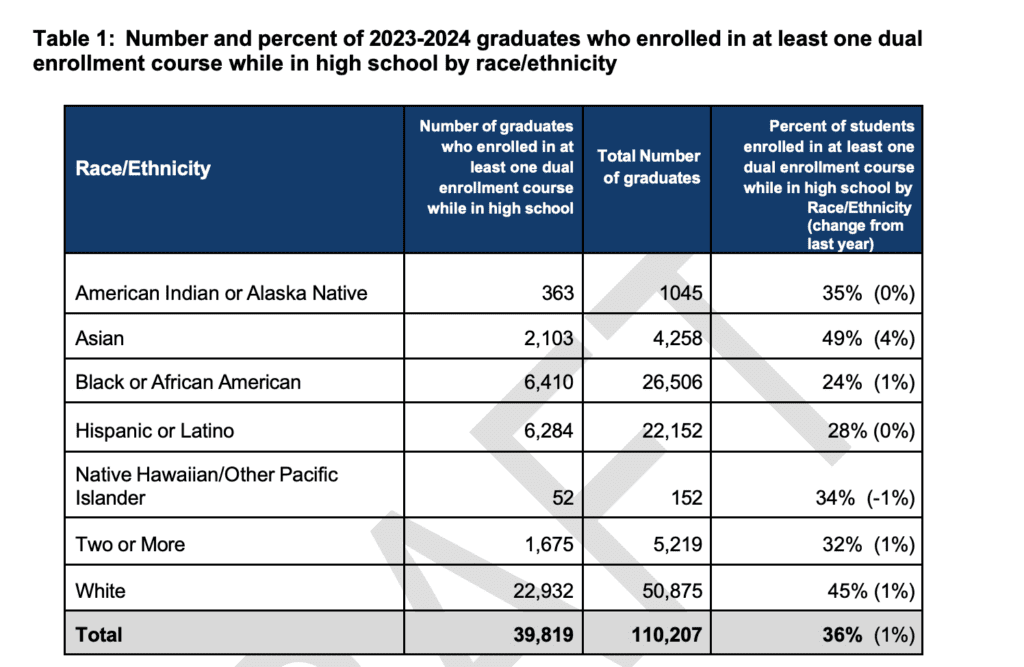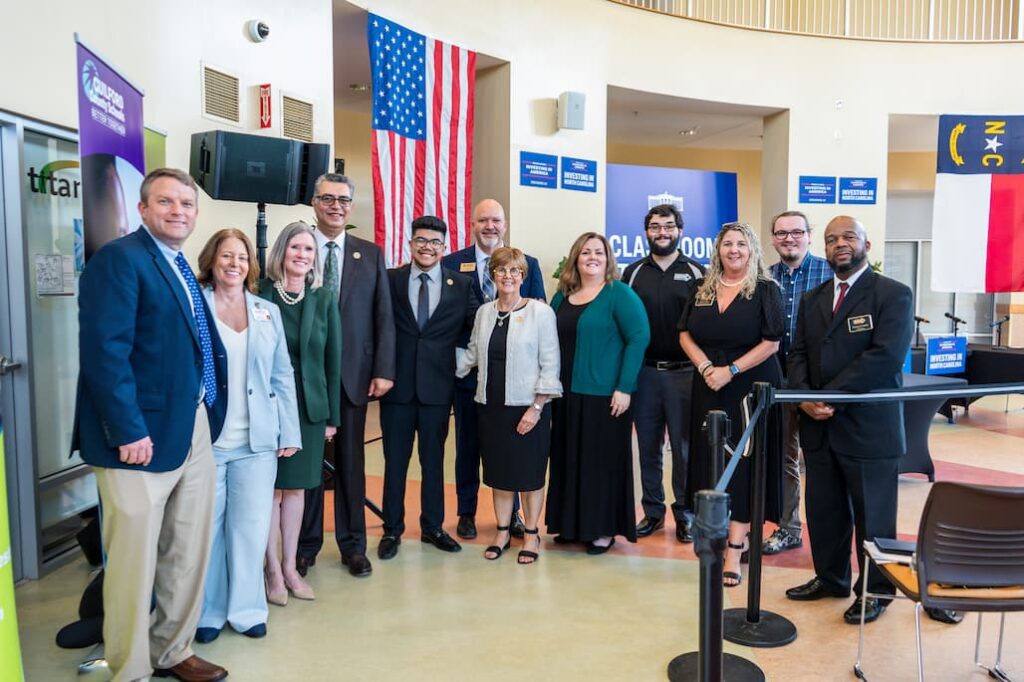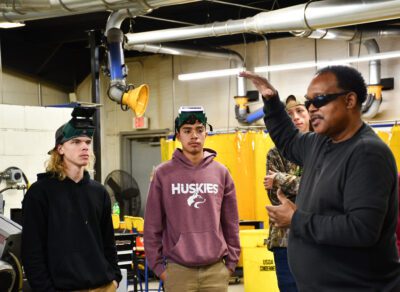
|
|
The State Board of Community Colleges discussed dual enrollment report and voted to approve new Cooperative Innovative High Schools, local presidents
There were 85,982 high school students in North Carolina enrolled in at least one dual enrollment course during the 2023-24 school year, according to an annual report to the General Assembly on Career and College Promise (CCP) — reflecting a 10% increase from 2022-23.
The report, which was approved by the State Board of Community Colleges at its meeting last week, shows that nearly 8,000 of those students were from private schools and homeschools. The report is produced by the State Board of Education, North Carolina Department of Public Instruction (DPI), N.C. Community College System (NCCCS), UNC System, and the North Carolina Independent Colleges and Universities.
“We’ve been doing Career and College Promise in our state for over a decade, and we’ve grown (in) 2013-14 from just over 11,000 students, to our present day report of almost 86,000 students,” said Aaron Mabe, the N.C. Community College System’s (NCCCS) dual enrollment director. “And at this point in time, we are at pre-pandemic levels.”

In North Carolina, dual enrollment opportunities for high school students have existed for more than 30 years. The state’s dual enrollment program, Career and College Promise (CCP), was created in 2011 to provide structured opportunities for high school students to earn college credits tuition-free that “lead to a certificate, diploma, or degree as well as provide entry-level jobs skills.”
CCP includes three pathways:
- College transfer (CTP) is designed for students planning to continue their educational career beyond high school to eventually achieve an associate or bachelor’s degree at a community college or university. This is the most popular CCP pathway, per the report, with 58% of CCP students enrolled in transfer courses.
- Career and technical education (CTE) allows students to begin a certification or diploma program in a particular technical field or career area. As of 2018, this pathway also includes workforce continuing education opportunities. About 16% of CCP students are enrolled in CTE courses.
- Cooperative Innovative High Schools (CIHS), commonly known as early colleges, allow students to work simultaneously toward completion of both the high school diploma and an associate degree, transferable credit, or certificate. Approximately 26% of CCP students were enrolled at a CIHS, the report said.
During the 2023-24 school year, there was a 19% increase in CTE participation and a 12% increase in transfer course enrollment, the report shows.
North Carolina’s Career and College Promise (CCP) Program has been recognized as a model dual enrollment program and as a model for dual enrollment policy by the Education Commission of the States. Additionally, NC is a leader in the nation in the number of established Cooperative Innovative High Schools (CIHS). The strength of collaborative partnerships between high schools and colleges, statewide articulation agreements, the requirement for structured pathways, student eligibility criteria, state-level agency collaboration and state-wide policy and funding are what make NC’s Career and College Promise Program a model for other states.
2023-24 report on Career and College Promise
In 2023-2024, the total estimated curriculum full-time equivalent (FTE) cost reported for CCP was $167,052,234. The state pays for the tuition of participating students.
“Relative to previous years, the cost associated with each Career and College Promise program increased in tandem with increases in enrollment,” the report says.
While overall enrollment is going up, the report shows that enrollment in individual classes is also increasing, along with the number of credits and credentials earned.
“Our enrollment is going up, but we’re also seeing that our students are taking more classes,” Mabe said.
Here are a few highlights from 2023-24:
- CCP students earned a total of 4,124 credentials, a 24% increase from the last year.
- Students enrolled in more than 220,000 credit-level courses, a 14% increase.
- 1,918 individual students earned 5,288 industry-recognized credentials through high school CTE courses, based on DPI data.
- 3,498 CIHS students graduated with an associate degree. This is an increase of 97 students from the previous school year. An additional 1,139 applications from CIHS students to UNC System schools were also accepted.
Generally, CCP students perform better than their peers who are not enrolled in CCP, the report shows.
In fall 2023, CCP students completed 86% of their credit-level courses with a C or better, for example, compared to 74% of the general student population.
On Thursday, the Board also discussed access to CCP courses.
According to the report, nearly 40,000 high school graduates in 2023-2024 had enrolled in at least one dual enrollment course. That’s 36% of all graduates, an increase of 2,002 students (1%) from 2022-23.
The report also includes demographic information on dually enrolled students, shown in the chart below. Black and Latino students have the lowest rate of participation in CCP, at 24% and 28%, respectively. Asian and white students have the highest rates of participation, at 49% and 45%.

Early colleges had the highest percentage of non-white students, at 54%. Overall, 56% of CCP participants are white, the report says.
“Based on the enrollment data above, while there remains continued work, NCDPI is encouraged with how PSUs (Public School Units) are creating environments for access and opportunity among all race/ethnicity groups for dual enrollment,” the report says. “NCDPI and NCCCS continue to work closely together to support school districts and colleges to strengthen partnerships. …Staff from each agency host regular webinars to share promising practices in CCP that promote expanded awareness, access, and student success.”
On Thursday, Board members raised concern about gender demographics reflected in the report. During the 2023-24 school year, 59% of CCP participants were female, the report said.
“It is a general trend in higher ed that we’re seeing that kind of number. And yes, it is concerning,” NCCCS President Dr. Jeff Cox told the Board. “We’re seeing our young men disconnect in larger numbers from higher ed generally. It may be particularly true with the universities, but it is also true with us.”
According to the report, the CTE pathway had the highest percentage of male students at 55%.
At the end of the presentation of the report, the Board heard remarks from a former CCP student, Isaias Martinez Hernandez.
Martinez Hernandez, who was dually enrolled at Randolph Community College, completed an EMT license and 40 hours of transfer credit before graduating from Uwharrie Charter Academy High School in Asheboro.

He is currently attending NC State University on a full scholarship and is working toward becoming a trauma surgeon. Martinez Hernandez said he is really grateful for the CCP program and for all the opportunities it provided him.
“All of those 40 hours of college transfer credits were completely free of charge for me — the only thing I had to pay for was for my EMT license, the test, and my uniform,” he said. “So I completed my EMT license and 40 hours of credit for under $100, and that’s truly amazing.”
You can read the full draft CCP report on the system’s website.
New CIHS programs
On Friday, the Board also voted to open two new CIHS’s with funding for the 2025-26 school year: Moore County Cooperative Innovative High School and Martin Innovative Early College High School.
All funding requests must go to the General Assembly for allocation and final approval.
North Carolina currently has 134 CIHS programs, which also includes middle colleges and STEM and career academies.
In December, the General Assembly approved two other new CIHS applications: Dare County Early College High School and Rockingham County CTE Innovation High School. Those schools reflect the first CIHS program in Dare County and the second in Rockingham, respectively.
Research shows that the benefits of CCP are most evident in the CIHS pathway.
High school retention and completion rates for CIHS were above the state averages, with the average CIHS rates above 95%. The average high school drop-out rate of CIHS programs was below the state average.
CIHS students at community colleges received better grades, on average, than the general population of students, with 88% averaging a passing grade of a C or better. This is 14% higher than the general population.
Enrollment in CIHS in 2023-2024 was 28,942 students; this is an increase of 580 students from the previous school year. In total, 6,274 students graduated from Cooperative Innovative High Schools in 2023-2024, an increase of 64 students from the previous year.
2023-24 annual report on CCP
Updates on local president searches
During last week’s meeting, the Board also approved several items related to local college presidents.
First, the Board approved Steve Woodruff as interim president for Rockingham Community College, effective March 1. Woodruff is Rockingham’s vice president for administrative services. The college’s current president, Dr. Mark Kinlaw, will retire on Feb. 28 after 10 years at the helm.
Second, the Board approved the new president for the college, which was announced on Monday. Dr. Sylvia Cox from Southeastern Community College will start as the college’s sixth president on May 1, according to a press release.
Since 2021, she has served as executive vice president and chief academic officer at Southeastern, where she has led academic affairs, workforce development, and student services.
“I am incredibly honored to have been selected as the next president of Rockingham Community College,” Cox said. “RCC is not just a college; it serves as a pillar of opportunity, innovation, and lifelong learning. It is truly humbling to follow in the footsteps of Dr. Mark Kinlaw, whose leadership has been instrumental in RCC’s success.”
Finally, the Board approved Dr. Kenneth Boham as interim president of Piedmont Community College, following the departure of current president, Dr. Pamela Senegal. He will start March 3, a college press release says.
Boham served as president of Caldwell Community College and Technical Institute from 1995 until his retirement in 2016. He has served as interim president at Mayland Community College, Martin Community College, James Sprunt Community College, and Johnston Community College.
“As we welcome Dr. Boham, we are confident in his ability to provide steady leadership as we begin the search for a president,” said Antonio Foster, Piedmont’s board of trustees chair. “The Board looks forward to working together to ensure a smooth transition and continued success for our students, faculty and staff.”
The full Board meets next April 2 and 4.
Editor’s note: Pamela Senegal serves on the board of directors of EducationNC.






